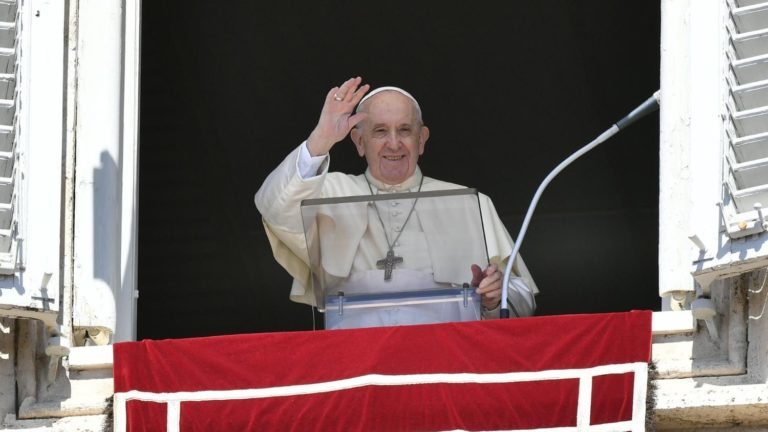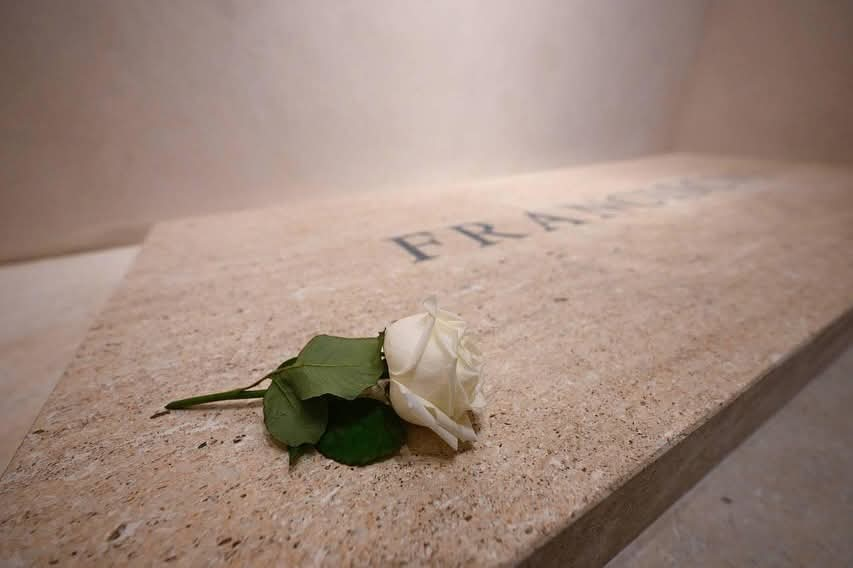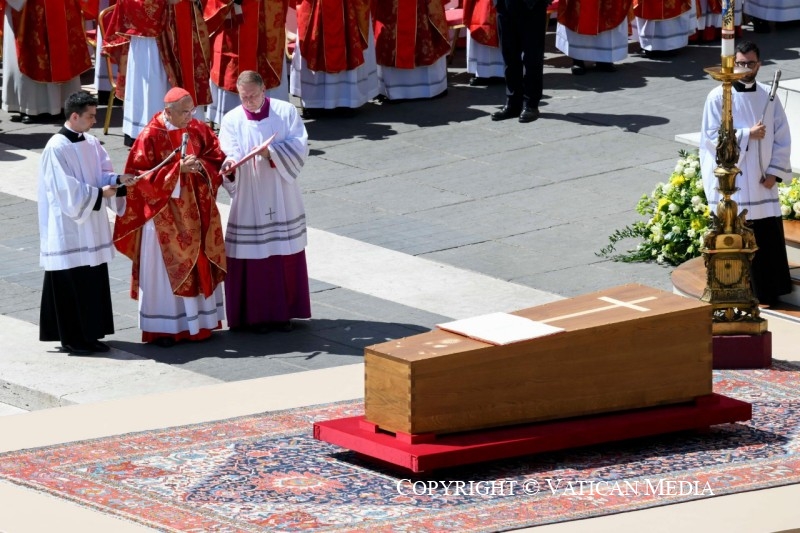Jesus Brings Faith to the Center, Pope Stresses
Holy Father's Full Angelus Address

Jesus brings faith to the center, Pope Francis reminded the faithful in his Sunday Angelus address in St. Peter’s Square.
He explained the day’s Gospel reading, in which Jesus and the disciples scandalized some scribes and Pharisees by failing to observe ritual washing before a meal. Why? The Lord was more concerned with what came from within than without. Jesus put faith at the center.
“We too can ask ourselves: why do Jesus and his disciples disregard these traditions? After all, they are not bad things, but good ritual habits, simple washings before eating,” the Pope said. “Why doesn’t Jesus attend to it? Because for Him it is important to bring faith back to its center.
“In the Gospel, we see it repeatedly: this bringing faith back to the center. And to avoid a risk, which applies to those scribes as well as to us: to observe outward formalities, putting the heart and the faith in the background… Outward formality and not the heart of faith: this is a risk. It is the risk of a religiosity of appearances: looking good on the outside while failing to purify the heart.”
Following is the Holy Father’s full commentary, provided by the Vatican:
Dear Brothers and Sisters, Buongiorno!
The Gospel for today’s liturgy shows a few scribes and Pharisees amazed by Jesus’ attitude. They are scandalized because his disciples pick up food without first performing the traditional ritual ablutions. They think among themselves “This way of doing things is contrary to the religious practice” (cf. Mk 7:2-5).
We too can ask ourselves: why do Jesus and his disciples disregard these traditions? After all, they are not bad things, but good ritual habits, simple washings before eating. Why doesn’t Jesus attend to it? Because for Him it is important to bring faith back to its center. In the Gospel, we see it repeatedly: this bringing faith back to the center. And to avoid a risk, which applies to those scribes as well as to us: to observe outward formalities, putting the heart and the faith in the background. Many times we too “put makeup” on our soul. Outward formality and not the heart of faith: this is a risk. It is the risk of a religiosity of appearances: looking good on the outside while failing to purify the heart. There is always the temptation to “organize God” with some outward devotion, but Jesus does not settle for this worship. Jesus does not want outward appearances, he wants a faith that touches the heart.
In fact, immediately afterward, he calls the people back to speak a great truth: “there is nothing outside a man which by going into him can defile him, but the things which come out of a man are what defile him” (v. 15). Rather, it is “from within, out of the heart” (v. 21) that evil things are born. These words are revolutionary because in the mindset of the time it was thought that certain foods or external contacts would render one impure. Jesus reverses the perspective: what comes from the outside does not do harm, but rather, what is born from within.
Dear brothers and sisters, this also pertains to us. We often think that evil comes mainly from the outside: from other people’s conduct, from those who think badly of us, from society. How often we blame others, society, the world, for everything that happens to us! It is always the fault of “others”: it is the fault of people, of those who govern, of misfortune, and so on. It seems that problems always come from the outside. And we spend time assigning blame, but spending time blaming others is wasting time. We become angry, bitter and keep God away from our hearts. Like those people in the Gospel, who complain, who are scandalized, who cause controversy, and do not accept Jesus. One cannot be truly religious in complaining: complaining poisons, it leads you to anger, to resentment, and to sadness, that of the heart, which closes the door to God.
Today let us ask the Lord to free us from blaming others – like children: “No, it wasn’t me! It’s the other one, the other one…”. Let us ask in prayer for the grace not to waste time polluting the world with complaints, because this is not Christian. Jesus instead invites us to look at life and the world starting from our heart. If we look inside, we will find almost all that we despise outside. And if, sincerely, we ask God to purify our hearts, that is when we will start making the world cleaner. Because there is an infallible way to defeat evil: by starting to conquer it within yourself. The first Fathers of the Church, the monks, when they were asked: “What is the path of holiness?”, the first step, they used to say, was to blame yourself: blame yourself. Blaming ourselves. How many of us, during the day, in a moment during the day, or a moment during the week, are able to blame ourselves within? “Yes, this one did this to me, the other one … that is barbarity…”. But me? I do the same thing, or I do it this way…. It is wisdom: learning to blame yourself. Try to do it, it will do you good. It does me good when I manage to do so, but it is good for us, it everyone good.
May the Virgin Mary, who changed history through the purity of her heart, help us to purify our own, by overcoming first and foremost the vice of blaming others and complaining about everything.
__________________________________
After the Angelus the Holy Father continued:
Dear brothers and sisters, with great concern I am following the situation in Afghanistan, and I take part in the suffering of those who are grieving for the persons who lost their lives in the suicide attacks that happened last Thursday, and of those who are seeking help and protection. I entrust the deceased to the mercy of Almighty God and I thank those who are striving to help that population so tried, in particular the women and children. I ask everyone to continue to help the needy and to pray that dialogue and solidarity may lead to the establishment of a peaceful and fraternal coexistence and offer hope for the country’s future. In historic moments like this one, we cannot remain indifferent; the history of the Church teaches us this. As Christians this situation obligates us. For this reason, I address an appeal, to everyone, to intensify your prayer and practice fasting. Prayer and fasting, prayer and penance. This is the moment to do so. I am speaking seriously: intensify your prayer and practice fasting, asking the Lord for mercy and forgiveness.
I am close to the population of the Venezuelan state of Mérida, hit in recent days by flooding and landslides. I pray for the deceased and their family members and for those who are suffering due to this catastrophe.
I address a cordial greeting to the members of the Laudato Si’ Movement. Thank you for your commitment to our common home, particularly on the World Day of Prayer for Creation and of the subsequent Time of Creation. The cry of the Earth and the cry of the poor are becoming ever more serious and alarming, and they call for a decisive and urgent action to transform this crisis into an opportunity.
I greet you all, Romans and pilgrims from various countries. In particular, I greet the group of Salesian novitiates and the community of the Episcopal Seminary in Caltanissetta. I greet the faithful from Zagabria and those from Veneto; the group of students, parents, and teachers from Lithuania; the youth Confirmation candidates from Osio Sotto; the young people from Malta who are undertaking a vocational journey, those who have done a Franciscan hike from Gubbio to Rome and those who are beginning a Via lucis with the poor in railroad stations.
I address a special greeting to the faithful gathered at the Sanctuary of Oropa for the celebration of the coronation and of the effigy of the Black Madonna. May the Blessed Virgin accompany the journey of the People of God on the path of holiness.
I wish everyone a happy Sunday. Please, do not forget to pray for me. Enjoy your lunch! Arrivederci!
Related

Cardinal Parolin at the Novendalia Mass: “Mercy leads us to the heart of faith”
Exaudi Staff
27 April, 2025
8 min

Pope Francis’ Tomb in Santa Maria Maggiore
Exaudi Staff
27 April, 2025
1 min

Mercy and the joy of the Gospel are two key concepts of Pope Francis
Exaudi Staff
26 April, 2025
9 min

Thousands of faithful bid farewell to Pope Francis in St. Peter’s Square
Exaudi Staff
26 April, 2025
2 min
 (EN)
(EN)
 (ES)
(ES)
 (IT)
(IT)

